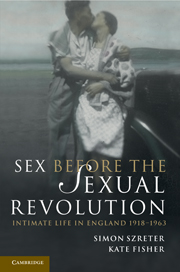Book contents
- Frontmatter
- Contents
- Acknowledgements
- 1 Introduction
- Part I What was sex?
- Part II What was love?
- Part III Exploring sex and love in marriage
- 6 Birth control, sex and abstinence
- 7 Bodies
- 8 Sex, love, duty, pleasure?
- 9 The morning after
- 10 Conclusion: private lives
- Appendix A The oral history sample: summary of project design and socio-demographic characteristics of the interviewees in Blackburn and north-west Hertfordshire
- Appendix B Note on social classification of the respondents
- Appendix C
- Bibliography
- Index
- Index of interviewees
8 - Sex, love, duty, pleasure?
Published online by Cambridge University Press: 05 June 2012
- Frontmatter
- Contents
- Acknowledgements
- 1 Introduction
- Part I What was sex?
- Part II What was love?
- Part III Exploring sex and love in marriage
- 6 Birth control, sex and abstinence
- 7 Bodies
- 8 Sex, love, duty, pleasure?
- 9 The morning after
- 10 Conclusion: private lives
- Appendix A The oral history sample: summary of project design and socio-demographic characteristics of the interviewees in Blackburn and north-west Hertfordshire
- Appendix B Note on social classification of the respondents
- Appendix C
- Bibliography
- Index
- Index of interviewees
Summary
Following the First World War, an emphasis on mutual sexual pleasure emerged in public discourse about marriage. For the ever more numerous writers of the marriage manual a central cause of marital unhappiness was sexual maladjustment: they sought to educate couples in erotic technique and in particular to teach men how to awaken women's sexual feelings and elicit pleasurable responses. Many historians stress the limited effect such messages had on the experiences of married couples. Indeed, arguably, the proliferation of sexual guidance literature and its popularity support the claim that couples struggled to enjoy mutually satisfying sexual lives during the early decades of the twentieth century. Lesley Hall has argued that despite Marie Stopes' championing of ‘ecstatic marital sex’, the letters written to her by thousands of women in the interwar period attest to a ‘picture … of English marital sexuality during the nineteenth century and the early part of the twentieth’ that is ‘grim and depressing’. Writing about the interwar period, Hera Cook linked women's descriptions of sexual unhappiness with the continued acceptance of male conjugal rights: ‘Mutual pleasure and tenderness was absent from these women's constructions of marital sexuality. They had disengaged from mutual sexual activity; what they accepted was a duty.’ According to this critique, for many women before the transformations of the 1960s, sexual experiences remained stymied by widespread sexual ignorance, the use of primitive methods of birth control, taboos against sexual experimentation, the acceptance of female passivity and the absence of open discussion of sexual issues.
- Type
- Chapter
- Information
- Sex Before the Sexual RevolutionIntimate Life in England 1918–1963, pp. 317 - 363Publisher: Cambridge University PressPrint publication year: 2010

